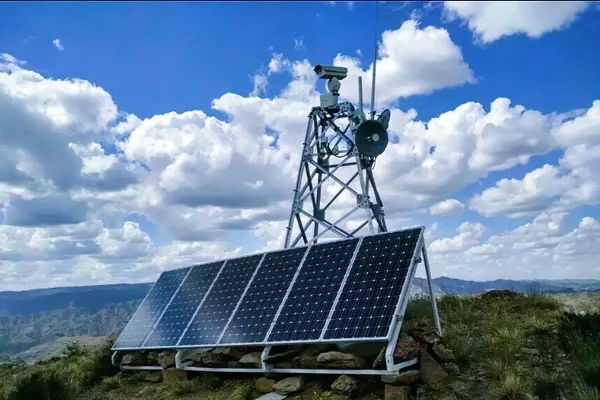Energy consumption is a big issue in the operation of communication base stations, especially in remote areas that are difficult to connect with the traditional power grid, as these consume large amounts of electricity daily. In this aspect, solar energy systems can be very important to meet this challenge. Communications companies can reduce dependency on the grid and assure a better and more stabilized power supply with the installation of photovoltaic and solar equipment. That independence is very critical in keeping communications reliable, mainly in rural and off-grid areas.
See also: What is the Power Consumption of a 5G Base Station?

Why Solar Energy for Communication Base Stations?
Being a clean and renewable energy source, solar energy emits much less greenhouse gas compared to the power generation by fossil fuels. This not only helps in mitigating the effects of climate change, but it also has large environmental benefits that are in sync with the efforts being taken globally to reduce the carbon footprint of communications infrastructure. Solar also provides reliability and sustainability, especially in remote areas where grid power is unavailable or unstable. This is especially important for keeping up uptime in communication base stations located in unattended, rural, or hard-to-reach areas, thus making it the preferred choice of energy for the base stations in communications.
On the other side, in terms of cost-effectiveness, the cost of solar photovoltaic (PV) panels has drastically reduced over the recent years and became increasingly cost-competitive with traditional sources of energy.
Further, solar systems save costs on maintenance, which could bring long-term savings for network operators. Additionally, there is the potential for technological advancement by the use of chalcogenide materials to drive further efficiency improvements in solar; however, calcite-Si tandem solar cells with certified efficiencies up to 33.9% have been realized, showing great strides taken in solar power.
Lastly, strong policy support for solar PV is driving the growth in global capacity. Various policies that governments have adopted, such as auctions, feed-in tariffs, net metering, and contracts for difference, promote solar adoption, which encourages the use of solar technology in communications base stations.
What are the components of a solar powered base station?
Solar Panels (Photovoltaic Panels):
These are the main elements which absorb sunlight and convert it into direct current (DC) electricity
Solar Regulator Charger:
This control unit regulates the unregulated DC output voltage of the solar array to a regular DC voltage, which is compatible with the load and the battery. It ensures proper charging of the batteries and protects them from overcharging.
Batteries:
They store excess energy from the solar arrays for use at night or when the power output of the solar panels does not reach the load of the base station. The unit will often have a charge control unit in order to protect the batteries and maintain their life cycle.
Inverter:
This device converts the 48V DC voltage from the batteries to 220V alternating current (AC) voltage to supply the AC loads in the base station
Control Unit:
This is a critical element that controls and regulates the power flow through the solar power system to feed the base station load.
Backup Power Source:
In case the solar panels and batteries cannot provide the needed amount of energy, a reserve power source, like a diesel generator, may be used to ensure there is never a disruption in the functioning of the base station.
Static Switch:
This component monitors the power of the solar power system and switches the AC loads to draw energy from the backup diesel generator, if the output power is less than required to meet the AC loads.
Power Amplifier, Baseband Unit, Radio-Frequency Unit, Power Supply, and Air Conditioner:
These are the base station equipment that are connected in the power consumption. The power consumption of these components is one of the critical factors in designing a solar power system that can meet the load demands. l
Battery Management System (BMS):
It is supposed to monitor the state of charge (SOC), state of health (SOH), and other parameters of the batteries in order to work efficiently and prolong their life. l
Energy Storage Systems (ESS):
Larger-scale energy storage systems can also be integrated with the solar power system in other cases in order to store extra energy and feed it back when there is high demand or low solar irradiance.
How do you maintain a solar-powered base station?
Regular Inspection:
The status of critical components, like the solar panels, batteries, inverters, controllers, etc., needs to be checked on regular basis for being in good operating condition. It may include frame distortion, broken glass, corrosion of batteries, and others.
Cleaning:
Solar panels should be cleaned regularly to prevent dust and dirt from accumulating over them since this reduces efficiency in their operations. Some of the causes of reduced power output in solar panels include dirt, bird droppings, and vandalism.
Electrical Maintenance:
This includes all the electrical connections, circuit breakers, surge protectors, etc., which is done for the safety and reliability of the electrical system. This particularly refers to grounding protection systems and lightning protection systems that must be checked from time to time to ensure safety when extreme weather conditions are given.
Maintenance of Batteries:
The batteries are special components of a solar system, which need special care in handling since they have a certain useful life and need to be stored and maintained under proper conditions. Battery maintenance includes checking for the state of charge of the battery, the electrolyte levels, and corrosion of the battery terminals.
System Optimization:
As technology evolves and environmental conditions change, systems may need to be optimized to improve efficiency. This may include upgrading hardware, improving energy management strategies, or adjusting system configurations.
 SolarInfo
SolarInfo